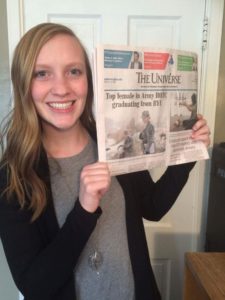
My first front page article
For me, freelancing came about as a regular job. I was a journalism student and a local translation company needed a blog writer and marketing manager. The business, in some ways, was its own freelance business run out of the owner’s home. As such, my work was remote. I was a W-2 employee, but could work my hours from home. In fact, I didn’t have an ‘office’ I could use if I wanted to, besides of course what my college campus offered.
It was a breath of fresh air. The next month, I happened to get an alert through the online college job board for a content writing position. It was also remote. I had a phone interview and then I had two freelance clients without looking specifically for it.
My last full semester of college started and freelancing was my only income. It couldn’t quite support my husband and I yet, though, and my husband was beginning training as an airline pilot. It was expensive and he wouldn’t receive a paycheck for about a year while he received his certifications.
I thought my last office job was behind me, but I knew that freelancing wasn’t what I needed it to be — not yet. I held onto a couple of the clients I had secured at that point, and notified the others that I would no longer be providing my services.
After a round of three interviews, they offered me a job as the marketing and communications director for the chamber of commerce in Ogden, Utah. It was a tremendous opportunity, especially right out of college, and I took it.
I spent 40 hours a week with the chamber and worked a few hours a week from home for my freelance clients. Almost two years in, and my husband’s job required moving out of state. It was perfect timing. At that point, I was working at least eight hours every weekend for my freelance copywriting clients. I gave the chamber a month’s notice and starting turning my freelance work into my full-time job, but not as a freelancer — as an agency. That’s where Salted Pages began.